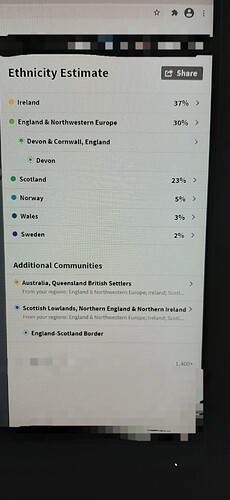? How is that a response to my post?
And the last sentence is just wrong.
The response was that there are alternatives to those companies who charge to trace ancestry through DNA - it can be done by researching historical records on line.
someone researched ours about 35 years ago, and apparently one of our rellies was John Montagu, 4th Earl of Sandwich, the guy credited with inventing (you guessed it) the sandwich! 
My DNA shows that I have 1.5% Neanderthal genes.
Of course there are, and many have already been mentioned. bBut I made those comments in answer to a specific question.
“Legend has it that during a late night card game, the Earl of Sandwich asked his chef to bring him a piece of meat, in between two slices of bread, and hence the name… Midnight snack”
I was able to get all the war records from a WW1 family member for a kids school project a couple of years ago. Addresses when enlisted, lots of letters back and forth between the widow and the government 15 years later arguing over money etc etc
Didn’t have to pay for any of it.
Only 1.5% ? I bet that’s a surprise.
I have a librarian friend who worked on digitising the AWM Service records.
Uncovered a photo of John Howard’s father or grandfather and had it framed, presented to him when he did a tour of the AWM.
Next budget, a nice appropriation for the AWM, more than they expected.
There’s actually very, very strong correlation between geographical ancestry and DNA in large parts of Ireland and, from memory, Wales.
at a very specific historical time though right…
Surprisingly, no.
I’ll try and find the articles I read earlier in the week. Though they were at the bottom of a very deep rabbit hole, so no guarantee.
Anyone who has dupuytrens could trace their ancestry to the Vikings - who ruled Ireland for some time ( and were around in northern England, Scotland , down the Volga and in the Med , including Greek Islands)
Dupuytrens is sometimes called “Celtic hand”, too. By the way, the Vikings never ruled Ireland. They set up what the French would call “comptoirs” at the towns of Dublin, Waterford, Cork and Limerick, certainly, but never went or got any further into the country.
Also known as the curse of the Vikings - not limited to the Celts
Before the invention of motor vehicles, people didn’t move around very much. In my line of work, I’ve used pretty basic population genetics approaches to differentiate wildlife populations separated by tens of kilometres - often well shorter than the distances over which individuals are capable of moving. Unless there is constant exchange between populations, you can often tell them apart and thus identify individuals and descendents of individuals who originated elsewhere. Broadly speaking, there is nothing particularly new about these approaches, and they have been tried and tested (and refined and improved) over several decades now.
There are always degrees of uncertainty in statistical approaches such as these, but companies such as Ancestry and 23andMe have such massive datasets, particularly for those of European ancestry, that I would expect these estimates to be pretty robust.
There were certainly Viking “kings” in Ireland, but there was a king every few metres up until Brian Boru, and even his claim was pretty much constantly disputed right up until his death defeating the first Viking wave.
My parents did it through National Geographic a d despite my father having a large percentage of Dutch ancestry we were unsuprised by the results (mum was like 98% Irish).
It also has a feature where it links your DNA to famous people from the past and one Dad got was Francis Drake. We all rolled his eyes at him and said, everyone related I’d you go back far enough, but dad is into family history and actually found the link! And found out Francis Drakes cousins that sailed with him and helped set up the British Indian Company and the Slave trade to the US were brothers of an ancestor  . My ancestor (female) married a farmer and lived a simple life while her brothers weren’t great guys!
. My ancestor (female) married a farmer and lived a simple life while her brothers weren’t great guys!
Thanks for the reply. I understand it conceptually, but I guess I was trying to get at the point that saying you have “Welsh” and “Norwegian” DNA is really saying "you share some percentage of the genetic variation that is found in genetic samples from Wales in the period X to Y.
If you went back and looked at that Welsh sample from the period and said “where did their ancestors come from” with the same assumptions you get, say, "you have x% Scandinavian, and y% bohemian (or something, I don’t know the flow of historical populations). And if you take it back further you get z% African.
So I guess my thought was that the attribution of genetic variation to a particular group at a particular time in history contained a bunch of arbitrary decisions around groups and generic variations historically.
I don’t know, I’m speculating, but I feel it’s nice for the companies to be able to say “your ancestors were 60% Irish”, but it feels like " your ancestors shared variations in their DNA that were seen in a high percentage of the population of Cork between 800 and 900 years ago, who, and these variations were seen in the X, y and z historically, and it is speculated hypothesised that variation X first appeared in populations that lived in a, 400,000 years ago, but there are few samples and it’s only a barely significant probability that this variation is meaningful for separating humans by area of ancestors" wouldn’t be as easy to sell.
